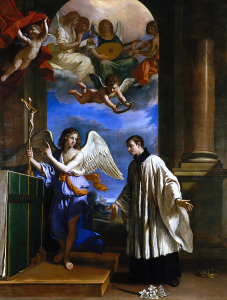Ord Om ordet
Den hl. Aloysius Gonzaga
2 Kings 11.1-20: Athaliah tore her garments and shouted, ‘Treason!’
Matthew 6.19-23: Do not store up treasures on earth.
The story of Queen Athaliah presents from the inside, as it were, the resistance of the ‘people of the land’ to Mosaic precepts and the cult of Israel’s God. In general the faith’s foes are present to us just in lists of names: as proverbial Abimeleks and Ogs slain in battles. Athalia, like her mother Jezebel, show us Canaanite resistance from within.
Jean Racine, in his grand play about Athaliah, humanises her, presenting her as wounded, an aspiring peacemaker, a patron of ecumenism — though this project excluded Israelite religion. The fact remains: in order to secure her position, she cold-bloodedly murdered all her rivals young and old, including her grandchildren, only one of whom was saved by the ruses of a resourceful aunt: the Jehoash of our story.
We note the role priests play in this royal drama. Jehoida the priest mounts resistance to the queen, summoning loyalists and, notably, ‘Levites from all the cities of Judah’ to assure support for Jehoash, legitimate claimant to the throne. Whereas Jehoash’s father’s house for generations had apostatised, he was brought up in the Law, prepared for his kingly task.
When Jehoash was old enough, Jehoida brought him out surrounded by a bodyguard armed with ‘David’s spears and shields’. These he had had for safekeeping in the temple, relics of a time when the king was priestly and fought for God, not against him. The strategy worked — for a while.
Athaliah was eliminated. Jehoash began his long reign, ‘restoring the house of the Lord’ and living righteously as long as he had the priest Jehoida by his side. Only when Jehoida died did things go awry. Strikingly, even this carefully catechised monarch fell, ceding to the flattery of grandees instead of staying fixed on divinely inspired ideals.
In a fallen, pragmatically motivated world, it rarely works to combine the royal and priestly charism effectively in a single person. The pitfalls of politics and frailties of character are too great. The priestly dimension ends up compromised, and loses credibility as a result. Priesthood requires a degree of apartness and detachment. Presupposing readiness for self-oblation, it is alien to secular dynamics. That is why it is helpful to envisage the realisation of this twofold ideal in terms of an ecclesial body in which, as it were, king and priest work side by side, guiding, inspiring and, when needed, correcting one another.
For the two to become one, exceptional innocence is called for, like that of St Aloysius Gonzaga. Few of us possess such innocence, sadly. To own this fact honestly preserves us from becoming delusional and harmful.
Let us then each work loyally where we are called, remembering that the mystical Body as a whole can embody a perfection no individual can reach. And let us be firmly united in a single intention, that the Lord’s priestly kingdom come. Amen.

St Aloysius, whose feast day is today, painted by Guercino (Wikimedia Commons). The collect for today’s feast reads:
